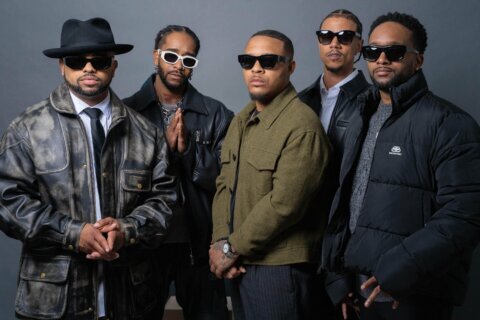The five-year partnership between Step Afrika! and Arena Stage in D.C. kicks off Tuesday with “Drumfolk,” running through June 26.
“We’ll be at Arena Stage for 32 performances,” . “I’m so excited about audiences in the Washington D.C. area getting to see this work live and in person. …
Founder C. Brian Williams told WTOP that Step Afrika! is “the first professional company in the world dedicated to the art form of stepping, a percussive art form that uses the body as an instrument.”
The show is inspired by a little-known historic event in Colonial America — the Stono Rebellion of 1739, which Williams called “one of the largest rebellions by African people against the institution of slavery in the New World.”
“This collection of Africans were not having it. They were fighting against the institution of slavery in 1739; they started a revolt that was squashed,” Williams said.
The enslaved people used drums to send signals to one another during the uprising, so the colonists wrote to the king of England asking permission to enact the Negro Act of 1740. “The colonists made the drum an illegal weapon and took the drum away,” Williams said.
They could not stop the beat, though: “Once the drum is taken away from African people, we see that it starts to live in the body of people.”
Don’t expect a narrative piece of theater; “Drumfolk” is an expressive dance performance.
“These are dancers inspired by this movement, so we’re taking a historical moment and interpreting it through our bodies,” Williams said. “The artists of Step Afrika! are the best in this art form of stepping in the world. I’ve assembled 16 of the most beautiful dancers who practice and love the tradition of stepping.”
In addition to the dancers, you’ll also see vocal performers and instrumentalists, including the local beatboxer Christylez Bacon. “He brings his vocal percussion skills combined with our body percussion to create some really interesting magic on stage,” Williams said. “Then we have some amazing percussionists, traditional African drummers that complement.”
The costuming reflects the historical echoes of the show. “We go from very period costuming to early 1700s American history all the way to current times,” Williams said.
It’s part of Williams’ personal quest to uncover his true history, and this incident was something he hasn’t known about.
“As an African American, as a descendant of ancestors who were enslaved, this is a huge part of our history that I’m confused why I never learned about it,” Williams said. “I’ve been studying African-American history my entire life, but I’ve had to do it outside my traditional school system. I went to Howard University … just so I can learn more about my own history.”
He invites folks of all backgrounds to learn this history, because it’s the full story of America.
“We’ve got to commit to that process,” Williams said. “We have to be open to these stories and be ready to receive them and be able to handle the difficulties that some of these stories bring forward and deal with them, reconcile them and then hopefully make much better decisions in the ways ahead. … The full story has still yet to be told.”
Listen to our full conversation here.








